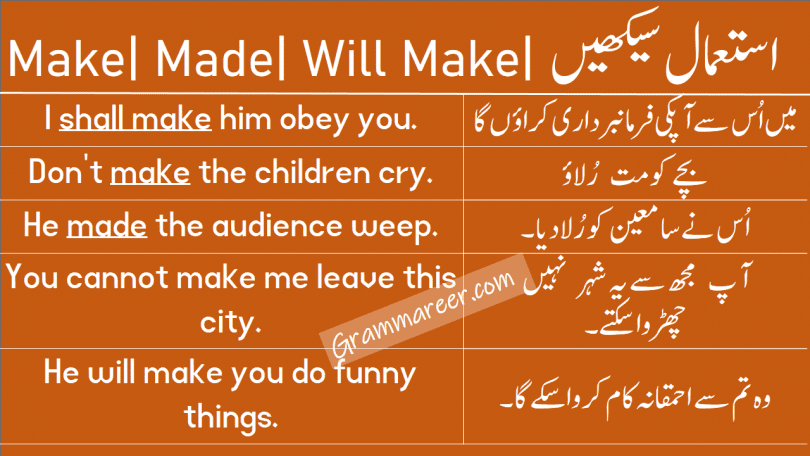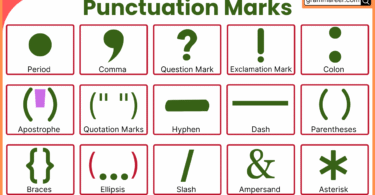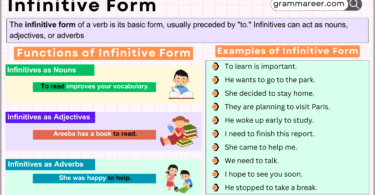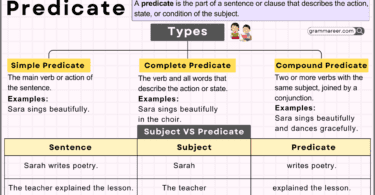Understanding the use of Make, Made, Shall Make, and Will Make is essential for forming causative sentences in English. These verbs help you express when someone causes another person to do something. In this blog post, you’ll learn how each form is used in different tenses with easy examples and Urdu translations. Practice more in our grammar section to strengthen your English.
Table of Contents
Use of Make, Made, Shall Make, Will Make
The verb “make” and its forms (made, shall make, will make) are commonly used in English to express causative actions—when someone causes another person to do something. These verbs add strength and clarity to your sentences and are important for speaking fluent English.
Let’s understand how each form is used in different tenses, along with simple examples and Urdu translations.
🔹 Use of Make (Present Tense)
“Make” is used in the present tense when you cause someone to do something now or regularly.
Structure:
Subject + make/makes + object + base verb
✅ Examples:
- They make me laugh a lot.
وہ مجھے بہت ہنساتے ہیں۔ - She makes her son clean the room.
وہ اپنے بیٹے سے کمرہ صاف کرواتی ہے۔ - I make him study every night.
میں اسے روز رات پڑھواتا ہوں۔ - Teachers make students work hard.
اساتذہ طلباء سے سخت محنت کرواتے ہیں۔ - You make me feel happy.
تم مجھے خوش محسوس کرواتے ہو۔
🔹 Use of Made (Past Tense)
“Made” is the past form of “make” and is used to describe causative actions in the past.
Structure:
Subject + made + object + base verb
✅ Examples:
- He made me cry yesterday.
اُس نے مجھے کل رُلایا۔ - The teacher made the students stay after class.
اُستاد نے طلباء کو کلاس کے بعد رکوا لیا۔ - She made her brother apologize.
اُس نے اپنے بھائی سے معافی منگوائی۔ - My mom made me finish my homework.
میری ماں نے مجھ سے ہوم ورک مکمل کروایا۔ - They made us wait for hours.
اُنہوں نے ہمیں گھنٹوں انتظار کروایا۔
🔹 Use of Shall Make (Future Tense – Formal or British English)
“Shall make” is typically used in formal or British English for future intentions or promises.
Structure:
Subject + shall make + object + base verb
✅ Examples:
- I shall make him tell the truth.
میں اُس سے سچ بلواؤں گا۔ - We shall make the children obey.
ہم بچوں سے فرمانبرداری کروائیں گے۔ - I shall make her respect the rules.
میں اُس سے اصولوں کی عزت کرواؤں گا۔ - You shall make them pay the price.
تم اُن سے قیمت وصول کرواؤ گے۔ - She shall make them work harder.
وہ اُن سے زیادہ محنت کروائے گی۔
🔹 Use of Will Make (Future Tense)
“Will make” is commonly used in spoken and written English for future actions.
Structure:
Subject + will make + object + base verb
✅ Examples:
- He will make you do it again.
وہ تم سے یہ کام دوبارہ کروائے گا۔ - They will make us join the meeting.
وہ ہمیں میٹنگ میں شامل کروائیں گے۔ - This book will make you think deeply.
یہ کتاب تمہیں گہرا سوچنے پر مجبور کرے گی۔ - She will make her sister cook dinner.
وہ اپنی بہن سے رات کا کھانا پکواۓ گی۔ - I will make them follow the instructions.
میں اُن سے ہدایات کی پیروی کرواؤں گا۔
📘 Summary Table
| Tense | Verb Phrase | Usage | Urdu Meaning Example |
|---|---|---|---|
| Present | make | Cause now or regularly | کروانا، بنانا |
| Past | made | Caused in the past | کروایا، بنایا |
| Future | shall make | Formal future intention | کرواؤں گا، بنواؤں گا |
| Future | will make | Future action | کروائے گا، بنائے گا |
🎯 Conclusion
Learning the correct use of make, made, shall make, and will make is crucial for expressing powerful and clear causative sentences in English. Practice with the examples above to master this grammar rule.
You May Also Like





